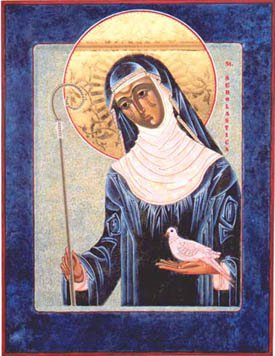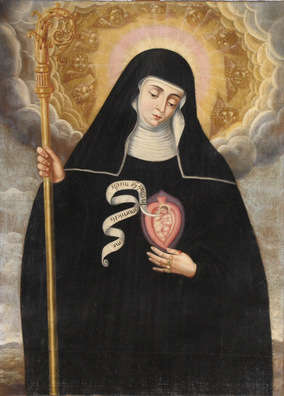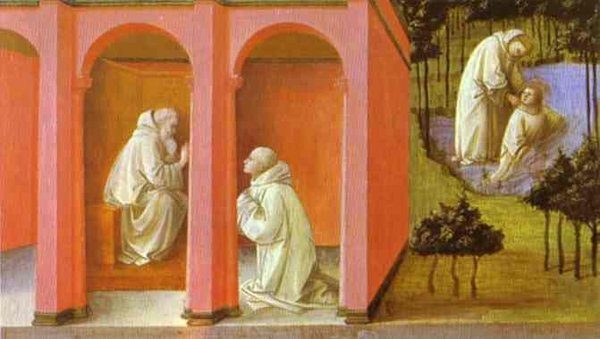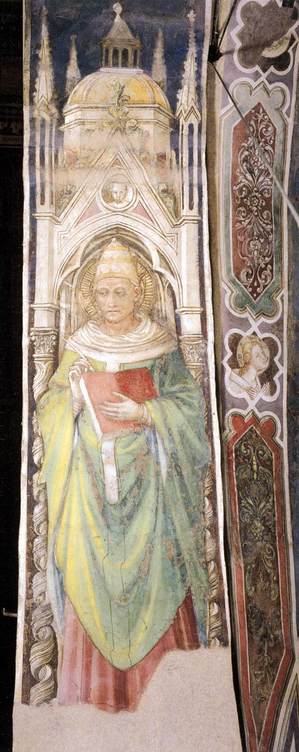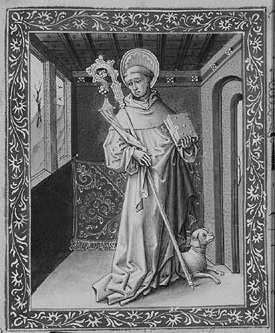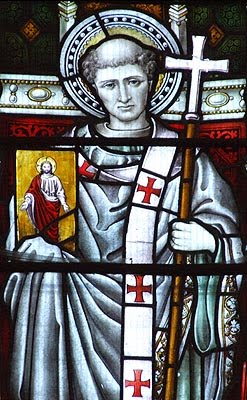With the Church in her Liturgy we pray to the Lord:
“…we may serve You with love and obtain perfect joy.”
Tag: Benedictine saints and blesseds
Saint Rabanus Maurus
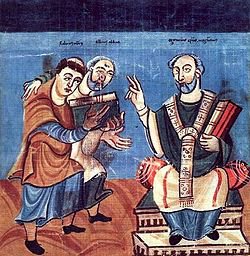 Saint Rabanus (c. 780-4 Feb. 856), a Benedictine monk, theologian, exegete, poet, abbot and archbishop of Mainz, called the “teacher of Germany.” Rabanus studied under Alcuin who gave him the name of “Maurus.” He authored De rerurm naturis (On the Nature of Things), De laudibus sanctae Crucis but he’s most known for his composition of “Veni Creator Spiritus,” the beautiful hymn we sing at Pentecost and any time we pray to the Holy Spirit.
Saint Rabanus (c. 780-4 Feb. 856), a Benedictine monk, theologian, exegete, poet, abbot and archbishop of Mainz, called the “teacher of Germany.” Rabanus studied under Alcuin who gave him the name of “Maurus.” He authored De rerurm naturis (On the Nature of Things), De laudibus sanctae Crucis but he’s most known for his composition of “Veni Creator Spiritus,” the beautiful hymn we sing at Pentecost and any time we pray to the Holy Spirit.
Saint Meinrad, the Martyr of Christ-like Hospitality
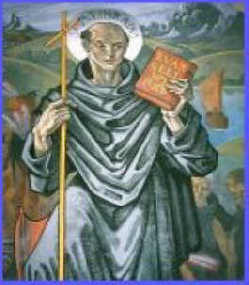 O God, You made glorious in the martyrdom of the hermit Meinrad. Through his intercession, help me to grow in my love for you and in the devotion of the Blessed Virgin Mary. May I follow his example in the Christ-like hospitality and in single-hearted prayer.
O God, You made glorious in the martyrdom of the hermit Meinrad. Through his intercession, help me to grow in my love for you and in the devotion of the Blessed Virgin Mary. May I follow his example in the Christ-like hospitality and in single-hearted prayer.
Saint Gertrude the Great
A pivotal figure in our theology of the Sacred Heart of Jesus is Saint Gertrude the Great (1256-1302). She was a nun of the Abbey of Helfta. Saint Gertrude is the only woman on the liturgical calendar to hold the title “the Great.”
Gertrude was an extraordinary student, she learned everything that can be learned of the sciences of the trivium and quadrivium, the education of that time; she was fascinated by knowledge and threw herself into profane studies with zeal and tenacity, achieving scholastic successes beyond every expectation. If we know nothing of her origins, she herself tells us about her youthful passions: literature, music and song and the art of miniature painting captivated her. She had a strong, determined, ready and impulsive temperament. She often says that she was negligent; she recognizes her shortcomings and humbly asks forgiveness for them. She also humbly asks for advice and prayers for her conversion. Some features of her temperament and faults were to accompany her to the end of her life, so as to amaze certain people who wondered why the Lord had favoured her with such a special love.
Gertrude was an extraordinary student, she learned everything that can be learned of the sciences of the trivium and quadrivium, the education of that time; she was fascinated by knowledge and threw herself into profane studies with zeal and tenacity, achieving scholastic successes beyond every expectation. If we know nothing of her origins, she herself tells us about her youthful passions literature, music and song and the art of miniature painting captivated her. She had a strong, determined, ready and impulsive temperament. She often says that she was negligent; she recognizes her shortcomings and humbly asks forgiveness for them. She also humbly asks for advice and prayers for her conversion. Some features of her temperament and faults were to accompany her to the end of her life, so as to amaze certain people who wondered why the Lord had favoured her with such a special love.
She had a vision of a young man who, in order to guide her through the tangle of thorns that surrounded her soul, took her by the hand. In that hand Gertrude recognized “the precious traces of the wounds that abrogated all the acts of accusation of our enemies” (ibid., II, 1, p. 89), and thus recognized the One who saved us with his Blood on the Cross: Jesus.
From that moment her life of intimate communion with the Lord was intensified, especially in the most important liturgical seasons Advent-Christmas, Lent-Easter, the feasts of Our Lady even when illness prevented her from going to the choir. This was the same liturgical humus as that of Matilda, her teacher; but Gertrude describes it with simpler, more linear images, symbols and terms that are more realistic and her references to the Bible, to the Fathers and to the Benedictine world are more direct.
Read the whole of the Pope’s October 6, 2010 address on saint Gertrude the Great.
Prayer through the intercession of Saints Benedict & Maurus
The Benedictines celebrate the feast of Saint Maurus, a first disciple of Saint Benedict on January 15 and the Roman Martyrology notes his feast day as today. Liturgical calendars of religious aren’t always the same, sometimes for very good reasons. For Saint Maurus’ feast day in January I posted a prayer for the sick through his intercession which may interest you. Today, we’re honoring Saint Benedict and his student Maurus, by giving this prayer more “press” recalling the profound love they had for the Cross of Christ.
May God’s will be done in all things, and so may it be done in your case, just as you seek and desire only the praise and honor of the all-holy Cross of our Lord Jesus Christ.
The life of Saint Maurus is filled with terrific narratives of healings at the request of this saint at the Throne of Grace. One such miracle was a man’s diseased arm that needed healing Maurus prayed prostrate “at the foot of the altar, pouring forth his soul in fervent prayer. Having finished praying, he took from the altar the case of relics which had been sent him by his master, St. Benedict, and went to the bedside of the sick man. Having exposed the relic of the Cross, he made the sign of the Cross over every part of the arm from the shoulder to the fingers,” saying:
Saint Gregory the Great
You received divine grace from heaven, O blessed Gregory, and strength from His divine power. You sought to follow the way of the Gospel, and your journey’s end brought you Christ’s reward. O blessed saint, beg Him to save us! (Troparion)
The September Martyrs: Blessed John du Lau & companions
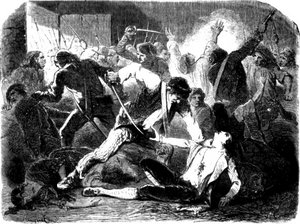 The Benedictines and Carmelites in some places in the USA, and of course in England and France, liturgically remember the September Martyrs, also called the Paris Martyrs; you will also see the memorial listed as “Blessed John du Lau and companions” after the Archbishop of Arles, the highest ranking prelate among the 191 martyrs. The Benedictine nuns of Stanbrook Abbey are connected with the Carmelite nuns and retain some of the relics. Historians tells us that about 1500 clergy and religious were killed in 1792. And this act of martyrdom inspired the writing of Georeges Bernanos’s “Dialogues of the Carmelites” and the famous opera of Francis Poulenc, by the same name.
The Benedictines and Carmelites in some places in the USA, and of course in England and France, liturgically remember the September Martyrs, also called the Paris Martyrs; you will also see the memorial listed as “Blessed John du Lau and companions” after the Archbishop of Arles, the highest ranking prelate among the 191 martyrs. The Benedictine nuns of Stanbrook Abbey are connected with the Carmelite nuns and retain some of the relics. Historians tells us that about 1500 clergy and religious were killed in 1792. And this act of martyrdom inspired the writing of Georeges Bernanos’s “Dialogues of the Carmelites” and the famous opera of Francis Poulenc, by the same name.
Blessed Alfredo Ildefonso Schuster
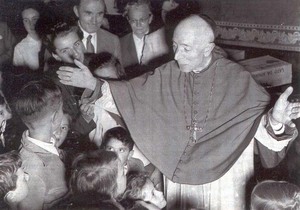 Almighty God, through Your grace, Blessed Alfredo Ildefonso, by his exemplary virtue built up the flock entrusted to him. Grant that we, under the guidance of the Gospel, may follow his teaching and walk in sureness of life, until we come to see You face to face in Your eternal kingdom.
Almighty God, through Your grace, Blessed Alfredo Ildefonso, by his exemplary virtue built up the flock entrusted to him. Grant that we, under the guidance of the Gospel, may follow his teaching and walk in sureness of life, until we come to see You face to face in Your eternal kingdom.
Alfredo Ludovico Luigi Schuster was born in Rome of Bavarian immigrants on January 18, 1880. At 11 years old he entered the Benedictine Abbey of Saint Paul outside the Walls taking the name Ildefonso in 1896; he professed solemn vows in 1902. Philosophy studies was done at Sant’Anselmo and theology was studied at Saint Paul’s where he was ordained a priest on March 19, 1904.
Service to the monastic way of life, besides the daily opus Dei (the praying of the Divine Office), included scholarship, novice master for 8 years, prior of the for 2 years, procurator of the Cassinese Congregation of the Benedictine monks for 12 years and abbot-ordinary of Saint Paul outside the Walls from 1918 until 1929. He was President of the Pontifical Oriental Institute from 1919 to 1922.
On June 26, 1929, Pope Pius XI nominated him the Archbishop of Milan and a few weeks later created him a cardinal on July 15. In 1933, the Order of Malta honored Schuster with the Grand Cross for his service to the Church.
Cardinal Schuster died of natural causes on August 30, 1954. In 1957, Cardinal Giovanni Montini –later Pope Paul VI– introduced Schuster’s cause for canonization. It is said that upon opening Schuster tomb on January 28, 1985, his was incorrrupt; he beatied on May 12, 1996 by Pope John Paul II.
Days before Blessed Ildefonso died he said: “You want something to remember be by. All I can leave you is an invitation to holiness….”
Saint Bernard of Clairvaux
‘What shall I render unto the Lord for all His benefits towards me?’ (Ps. 116:12). Reason and natural justice alike move me to give up myself wholly to loving Him to whom I owe all that I have and am. But faith shows me that I should love Him far more than I love myself, as I come to realize that He hath given me not my own life only, but even Himself. Yet, before the time of full revelation had come, before the Word was made flesh, died on the Cross, came forth from the grave, and returned to His Father; before God had shown us how much He loved us by all this plenitude of grace, the commandment had been uttered, ‘Thou shalt love the Lord thy God with all thine heart, and with all thy soul and with all thy might’ (Deut. 6:5), that is, with all thy being, all thy knowledge, all thy powers. And it was not unjust for God to claim this from His own work and gifts. Why should not the creature love his Creator, who gave him the power to love? Why should he not love Him with all his being, since it is by His gift alone that he can do anything that is good? It was God’s creative grace that out of nothingness raised us to the dignity of manhood; and from this appears our duty to love Him, and the justice of His claim to that love. But how infinitely is the benefit increased when we bethink ourselves of His fulfillment of the promise, ‘thou, Lord, shalt save both man and beast: how excellent is Thy mercy, O Lord!’ (Ps. 36:6f). For we, who ‘turned our glory into the similitude of a calf that eateth hay’ (Ps. 106:20), by our evil deeds debased ourselves so that we might be compared unto the beasts that perish. I owe all that I am to Him who made me: but how can I pay my debt to Him who redeemed me, and in such wondrous wise? Creation was not so vast a work as redemption; for it is written of man and of all things that were made, ‘He spake the word, and they were made’ (Ps. 148:5). But to redeem that creation which sprang into being at His word, how much He spake, what wonders He wrought, what hardships He endured, what shames He suffered! Therefore what reward shall I give unto the Lord for all the benefits which He hath done unto me? In the first creation He gave me myself; but in His new creation He gave me Himself, and by that gift restored to me the self that I had lost. Created first and then restored, I owe Him myself twice over in return for myself. But what have I to offer Him for the gift of Himself? Could I multiply myself a thousand-fold and then give Him all, what would that be in comparison with God?
Saint Augustine of Canterbury
One of the benefits of being in Rome these days is to be where things began. In this case, seeing where we believe Pope Saint Gregory the Great sent Augustine from to Canterbury, England as a monk, bishop and missionary. Augustine died in 604.
